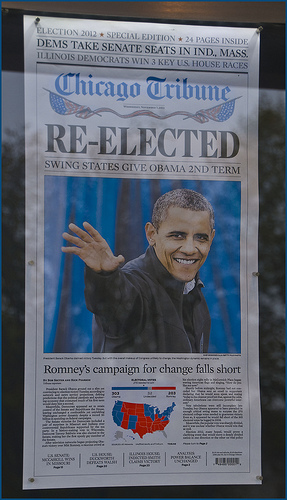What Do the Election Results Mean for I.P.?
In the wake of President Obama‘s solid re-election victory last night, we are left wondering (geeks that we are) about what (if anything) an Obama second term suggests about the future of IP law. We’ll talk mostly about copyright policy here: Any action on IP policy in the next couple of Congresses would probably focus on copyright, not least because we’ve just been through a substantial reform of the patent law and no one has any appetite to revisit that right away.
Even focusing only on copyright, the picture is far from clear. Millions of people joined in a wave of online activism back in January to defeat the copyright expansions offered in the SOPA and PIPA bills. But the coalition that defeated SOPA and PIPA is new and no one’s sure whether it’s a one-off or the beginning of a broader movement to slow, stop, or even reverse copyright’s relentless expansion. We’d note also that two of the entertainment industry’s favorite people in the House, Reps. Howard Berman and Mary Bono Mack, were both defeated last night. We doubt the losses have much to do with the pair’s outspoken copyright maximalism, but losing Berman and Bono is a further blow to a pro-copyright side that is still getting its collective head around the SOPA/PIPA debacle.
We’ll make a (tentative) prediction: In the short-term, at least, the uncertainty following the defeat of SOPA and PIPA will lead to paralysis. We doubt that Congress will step up to the plate for any significant expansion of copyright, at least for now. Gigi Sohn of the online rights group Public Knowledge has issued a similar forecast.
The real question is what happens in the longer term. An increasing number of young people — the so-called “Digital Natives” — operate within an online environment in which they encounter norms and practices based around a freer environment for experiencing, sharing, and re-using content versus what the formal rules of copyright allow. Put more simply, the expectations of the Digital Natives, evidenced by their actual behavior online, are often at odds with the copyright law. And the collision between online culture and copyright is likely to have great salience for the Digital Natives — a group that values online freedom, both to consume and to create. We’re not really interested in whether these norms are right or wrong — moral judgment isn’t our comparative advantage. What interests us is how the political system will respond when the Digital Natives — who will comprise a larger share of voters soon — see instances of copyright invading their lives.
Our guess is that although copyright isn’t really an important national political issue now, it may well become one. And if it does, there are a couple of possibilities. First, if the GOP’s very deep losses last night prompt the party to take a good look at its future prospects, it’s possible that smart Republicans might conclude that elections will simply not be winnable in future unless the party finds a way to capture a larger share of the youth (and non-white) vote. One way to appeal to young people would be to identify with their interest in online freedom. And this would lead to a GOP that favors narrower copyright. This might be a good strategy for the GOP not least because the party doesn’t depend much now on the entertainment industry, compared with the Democrats, for whom it is a large source of support. If the GOP can drive a wedge between young people and entertainment industry-loving Democrats, that may be worth doing.
Now, this is not the only plausible outcome, and the Democrats have a possible strategy of their own. Seemingly endless growth in Silicon Valley and the tech industry generally are both raising tech’s political profile, and leading to fights between content producers and Silicon Valley tech companies — aka, content exploiters. And this presents a puzzle for Democrats. How to solidify ties to Silicon Valley while not cutting ties to the entertainment industry? The balancing act that’s necessary to keep both constituencies happy suggests that the Dems’ approach to copyright policy will no longer be limited to asking “what does the entertainment industry want?” The question will be the more complicated one of “what can we do to help content providers while not angering the Valley and also alienating the youth vote that is a very important part of our winning coalition?”
In any event, we are hopeful for a brighter future for copyright policymaking. One that does not simply look like a process of giving the entertainment industry whatever it demands, but instead, carefully balances the costs and rewards of copyright. Time will tell.


Comments